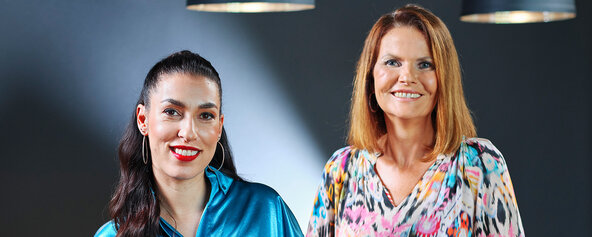
Tijen Onaran:I always pick one main theme to focus on each year. On New Year’s Eve, I sit down and think about what that will be, for the next 12 months. In 2022, I decided this year, my theme would be courage.
Ines Krummacker: I take a different approach. I set myself a challenge for each month, but I don’t define it by a specific term. I try and test myself and leave my comfort zone – it’s important because I want to keep developing myself.
Ines Krummacker: The shortage of skilled workers is certainly something people are talking about. But what’s the point of complaining? That is the easy way out – it is not motivating. What we must do is think about what we can change. Which target groups should we be focusing on? We need to be open to immigration and attracting skilled workers from abroad. And often, teams need to think about certain questions, such as do we absolutely need to fill a certain position? What can we do diferently to distribute the work efficiently? We also need to make our processes more digital and that is something employees need to be made aware of. Older colleagues can learn from younger ones, just as younger staff can benefit from the experience of their elders.
Tijen Onaran: When I look around, no matter what industry I look at, I see changes in motivation. Young people are asking themselves about their role at work and are looking for meaningful tasks. This is an interesting development for me, as things were different when I was growing up. When I was younger, the emphasis was always on performance and professional success was automatically rejected in money, promotion and status. It isn’t like that anymore. Young professionals are focused on how they deal with their managers and are calling for different values. What are you offering me? Will you involve me? Can you help me think in a visionary way?
Ines Krummacker: The way we approach candidates has changed. We launched a campaign using the WhatsApp messaging service to simplify the application process for young people. They don’t want things to be as complicated as they were in the past, so that makes it easier for them to reach us more quickly.
Ines Krummacker: We developed a management program called “From Boss to Coach,” to help our managers become inspiring leaders and be less hierarchical. The idea is to make our managers aware of employees’ strengths and promote team spirit in order to achieve shared goals. We basically want to make the company more successful, while always dealing with one another as equals. Anything else is no longer in keeping with the times.
Tijen Onaran: For the diversity generation, this is immensely important. Having employees with different backgrounds is part of the new normal. Living diversity is one of the keys to being an attractive employer, and heterogeneous teams mean greater success.
Ines Krummacker: We want to become much more mixed, that is another one of DMK’s goals. We benefit from different cultures, genders and the life experiences of employees with handicaps. One way we promote integration is by providing a sponsor for employees from other countries – we are doing that with our staff from Ukraine right now. We hope this means refugees of all generations are able to feel more at ease in the company and find their way more quickly. It helps people come together and feel as though they are part of the company.
Tijen Onaran: I notice that young women are paying more attention to role models who manage to balance their personal and professional lives. My mother is my best role model. She said to me, “Be independent and earn your own money!” That helped me a lot. Listening to myself more helped me filter out external influences. I was shaped by my strong mother and my father, who is a true feminist. I have met a lot of people who define themselves solely by their job, their position and how important they are. What happens to them when all that falls away?
Ines Krummacker: I think it’s good that there are more and more role models for women managers. And I do think that we women can afford to be stronger in the way we behave and present ourselves.
Ines Krummacker: The future lies in humanity in the company. We are supporting our employees. We realize the world of work has changed and we are really driven by the desire to keep on developing. That involves learning to listen to each other again and figuring out how to reconcile people’s needs with the culture of work.

